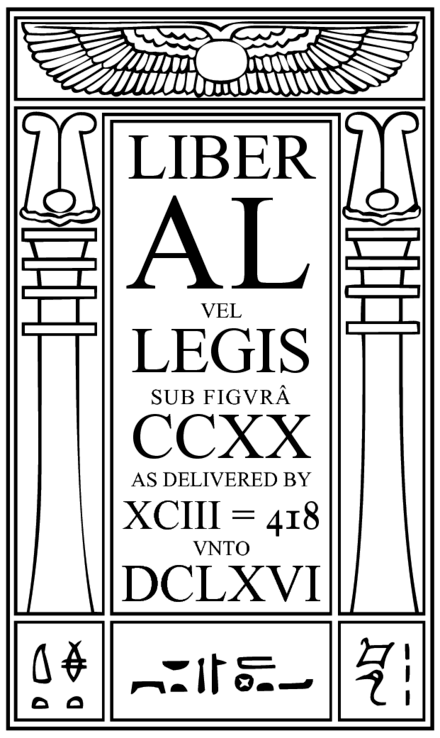“The Book of the Law” is a key text in the Thelemic religion, which Aleister Crowley founded. The book claims to be a communication from an otherworldly entity known as Aiwass, which Crowley received through an automatic writing process.
The book’s content is highly symbolic and esoteric, covering topics such as the nature of reality, the relationship between the individual and the divine, and the concept of “True Will.” It also contains instructions for various ritual practices, such as the “Liber AL” ritual, central to Thelemic practice.
One of the book’s central ideas is the concept of the individual’s True Will, which is viewed as their unique purpose or destiny in life. According to the book, the individual is responsible for discovering and fulfilling their True Will, which will eventually lead to spiritual growth and liberation.
10 Lessons from “The Book of the Law” by Aleister Crowley
The book emphasizes the importance of discovering and fulfilling one’s True Will, viewed as an individual’s unique purpose or destiny in life. Fulfilling one’s True Will is the key to spiritual growth and liberation.
Relationship with the divine
The concept of a person’s relationship with the divine: The book challenges traditional notions of the individual’s relationship with the divine. It implies that an individual can have a direct and personal relationship with God without using intermediaries such as priests or religious institutions.
Liber Al
The book contains instructions for various ritual practices, including the “Liber AL” ritual, central to Thelemic practice. These rituals are thought to be a way of reaching higher states of consciousness and aligning oneself with the divine.
Esotericism
The text’s symbolism and esotericism: The book is highly symbolic and esoteric, with complex and multi-layered meanings. To fully comprehend its teachings, careful study and contemplation are required.
The text’s content is highly contentious and has sparked intense debate and criticism. Others see it as a dangerous and corrupting spiritual text, while others see it as profound and transformative.
Summery of Liber AL vel Legis by Crowley
The Book of the Law, also known as Liber AL vel Legis, is the central sacred text of Thelema, a religion founded by Aleister Crowley in the early 20th century. According to Crowley, the book was dictated to him by Aiwass, and its three chapters are spoken by the deities Nuit, Hadit, and Ra-Hoor-Khuit. The book’s primary precept of the new spiritual age proclaimed, “Do what thou wilt shall be the whole of the Law.” The title Liber AL vel Legis refers to the manuscript’s delivery to Crowley by Aiwass, represented by the numbers 93 and 418, while Crowley is represented by 666. The book’s original title was Liber L vel Legis, and its manuscript is titled Liber 31, with Liber 220 being the edited, printed version. The book was received through a series of supernatural experiences, including invoking the god Thoth and visiting the Great Pyramid of Giza.
Who is this book for?
From an occultist point of view, the Liber AL vel Legis, also known as The Book of the Law, is considered the central sacred text of Thelema. It was allegedly dictated by a being called Aiwass to the occultist Aleister Crowley in 1904 in Cairo, Egypt.
According to Crowley, the reception of this book marked the beginning of a new spiritual era, known as the “Æon of Horus,” in which the central precept is “Do what thou wilt shall be the whole of the Law.” The book contains three chapters, each spoken by deities Nuit, Hadit, and Ra-Hoor-Khuit, and it is considered to hold complex numerical and literal puzzles that only a divine source could have produced.
The book is intended for those following the Thelemic path, emphasizing individualism, self-discovery, and personal responsibility. It offers a framework for ethical and spiritual living that encourages individual to find their true will and to act upon it without fear or hesitation. Through the text, readers can learn about Thelemic philosophy, magick, and mysticism, as well as gain insights into the universe’s workings and the nature of divinity. However, it is worth noting that the Liber AL vel Legis is considered a challenging and often enigmatic text that requires study, contemplation, and interpretation to comprehend its meaning fully.
Conclusion
“The Book of the Law” is a highly contentious and divisive text; some see it as a profound and transformative spiritual text and others as dark and dangerous. As a fictitious occultist book critic, I would say that the book is not for everyone, but it is a must-read for those interested in the Thelemic religion and Aleister Crowley’s teachings. It explores esoteric and mystical themes in depth and provocatively, challenging readers to question their assumptions about reality and the nature of spirituality.
